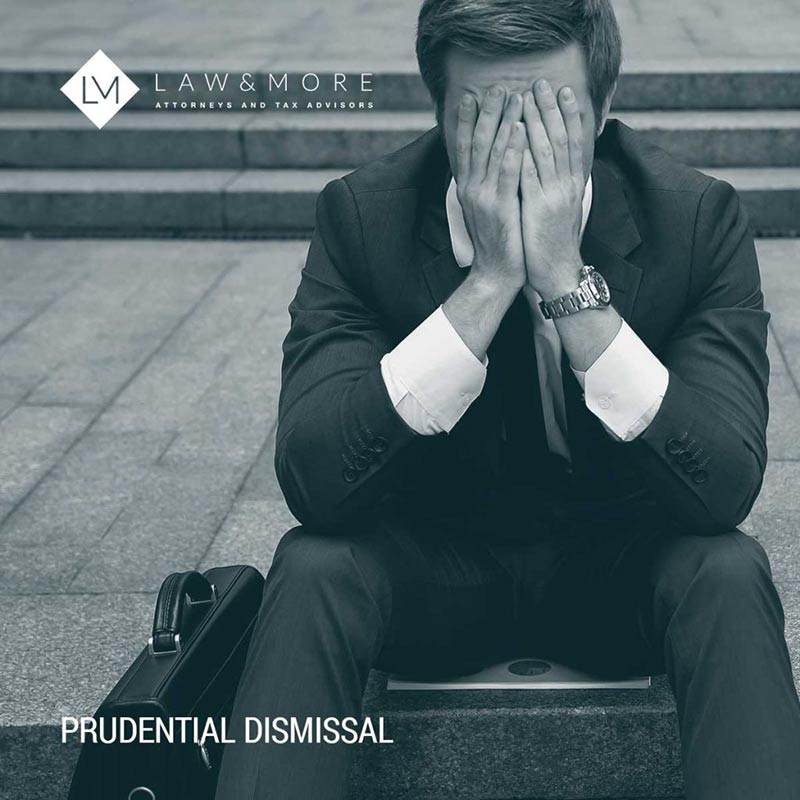Anyone can face dismissal
There is a good chance, especially in this uncertain time, that the decision regarding dismissal will be taken by the employer. However, if the employer wants to proceed with dismissal, he still must base his decision on one of the specific grounds for dismissal, substantiate it well and prove its existence. There are eight exhaustive legal grounds for dismissal.
The most relevant ground that deserves attention at the moment is prudential dismissal. After all, the impact of the corona crisis on companies is enormous and has consequences not only for the way in which work can be carried out within the company, but also and especially for the sales volume. As work comes to a standstill, most companies continue to incur costs. Soon the situation may arise in which the employer is forced to fire his staff. For most employers, wage costs are the highest cost item. It is true that in this uncertain period employers can appeal to the Emergency Fund for Employment Bridging (NOW) and the wage costs are partly compensated by the government, so that the employers will not dismiss their employees. However, the emergency fund only concerns a temporary arrangement for a maximum period of three months. After that, this compensation in wage costs will stop and many employees will still have to face dismissal due to economic reasons such as deteriorated financial position or loss of work.
However, before the employer can proceed with dismissal for business reasons, he must first apply for a dismissal permit from the UWV. To be eligible for such a permit, the employer must:
- properly motivate the reason for dismissal and demonstrate that one or more jobs, over a future period of 26 weeks, will necessarily be lost as a result of measures for efficient business operations which in turn are the result of business conditions;
- demonstrate that it is not possible to reassign the employee to another suitable position within his company;
- demonstrate that he has complied with the reflection principle, in other words the statutory order of dismissal; the employer is not entirely free to choose which employee to nominate for dismissal.
After the employee has been given the opportunity to defend himself against this, the UWV decides whether the employee can be fired. If UWV grants permission for dismissal, the employer must dismiss him by means of a cancellation letter within four weeks. When an employee does not agree with the UWV’s decision, he can submit a petition to the subdistrict court.
In view of the foregoing, the decision regarding dismissal cannot simply be taken by the employer and certain conditions, which are strict, apply to a valid dismissal. In addition, dismissal entails certain rights and obligations for the parties. In that context, it is important for the parties to keep the following points in mind:
- Prohibition of dismissal. When an employee has an employment contract for a definite or indefinite period, he receives a certain degree of dismissal protection. After all, there are a number of general and special prohibitions on dismissal based on which the employer may not dismiss his employee, or only under special circumstances, despite the grounds, such as prudential dismissal. For example, the employer may not dismiss his employee during illness. If an employee become ill after the employer has submitted the dismissal application to the UWV or an employee has already recovered when the dismissal permit was issued, the prohibition on dismissal does not apply and the employer can still proceed with dismissal.
- Transitional payment. Both permanent and flexible employees have a statutory right to transitional payment, regardless of the reason. Initially, an employee was only entitled to transition compensation after two years. With the introduction of the WAB as of 1 January 2020, the transition payment will be built up from the first working day. On-call workers or employees who are dismissed during the probationary period are also entitled to a transitional payment. However, on the other hand, the transition payment for employees with an employment contract of more than ten years will be abolished. This means that it will becomes ‘cheaper’ for the employer to dismiss an employee with a long-term employment contract.
Do you have any questions about dismissal? More information about the grounds, procedures and our services can be found on our dismissal site. At Law & More we understand that dismissal is one of the most far-reaching measures in employment law that has far-reaching consequences for an employee as well as an employer. That is why we use a personal approach and together with you we can determine your situation and the possibilities. Are you dealing with dismissal? Please contact Law & More. Law & More lawyers are experts in the field of dismissal law and are happy to provide you with legal advice or assistance during a dismissal procedure.
